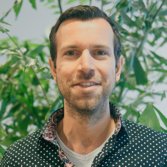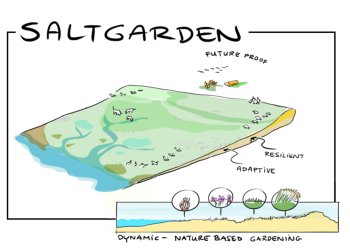In this STAR interview, we speak to Erik Horstman of the Faculty of Engineering Technology (ET). STAR is an acronym for (S)ituation, (T)asks, (A)ctions, (R)esults. We have many “star” colleagues at UT with interesting stories to tell. Erik Horstman aims with his research for Sustainable Adaptive Landscapes through Transdisciplinary Gardening to Advance the Resilience and Dynamics of our Ecological Natural Heritage, making the Wadden Sea a SALTGARDEN. 

Situation
What is/was the situation (S) of your research/initiative?
I’m currently working on the start-up of our SALTGARDEN project, which we got funded a year ago now. In this project, we will investigate the dynamics and resilience of the Wadden Sea salt marshes and their contribution to ecosystem functions and services at all levels. Many salt marshes in the Wadden Sea are managed for agriculture and coastal safety, resulting in static landscapes that are possibly lacking the resilience of more natural, dynamic salt marshes. We will compare the functioning and services of these managed and natural salt marshes. Within this project we combine our engineering perspective with ecological and socio-economic expertise through strategic collaborations with universities, research institutes and (non-)governmental institutions from Germany, Denmark and the Netherlands.
Tasks
What tasks (T) were or are you currently working on?
Most of the PhDs and postdocs within the project were hired in the last six months. Our PhD candidate, who will be working on the numerical modelling of biophysical interactions in salt marshes, just submitted his qualifier proposal. Besides supervising, I have been responsible for project management, including settling the collaboration agreement, organising project meetings, and writing the first project report. These tasks will largely be taken over by two part-time postdocs who have recently joined the project. My colleagues are currently working on the more exciting tasks: the selection of field sites and the development of vegetation experiments that we will be conducting to obtain new insights into the dynamics and resilience of different salt marsh vegetation types.
Actions
What actions (A) are you working on, and who is involved?
This past year, our team has been representing and promoting the SALTGARDEN project in the media and at some conferences. We have presented our project at the Ministry of Agriculture, Fisheries, Food Security and Nature and at the program kick-off that was organised by the funding organisations (NWO and the German Federal Ministries BMUV and BMBF). I am currently in Canada, where I have just been presenting our project at the Coastal Zone Canada conference in Charlottetown (PEI). This conference was dedicated to ‘strengthening coastal resilience and relationships’. There was a lot of interest in our project, and I also got some useful ideas from other researchers and practitioners that we can implement in our research.
Results
What results (R) do you hope to achieve, and how will society (or UT organisation) perceive them?
With this project, we aim for Sustainable Adaptive Landscapes through Transdisciplinary Gardening to Advance the Resilience and Dynamics of our Ecological Natural Heritage, making the Wadden Sea a SALTGARDEN. The Wadden Sea salt marshes have to deal with many different stressors daily. In this project, we aim to come up with Nature-based Gardening strategies that promote salt marsh resilience to cope with these stressors. It's interesting to think about ways we can help the Wadden Sea ecosystem adapt naturally. Doing this is not just about nature, it's also about improving the livelihoods and well-being of the people in the Wadden Sea communities, now and in the future.
UT Teacher of the Year 2024: Erik Horstman






